This post contains a referral link*
Vivoo caught me by surprise. I was expecting at-home urine tests hit to the consumer market in near future, but I didn’t realize there was one that’s been offering it for consumers for a while.
I monitor dozens of different biomarkers, I have done genetic testing, I collect different sleep and recovery metrics, and I have done home stool tests, but first time ever, I can get unique insights from my urine at home.
Ps. You can use my *referral link to get -20% off your Vivoo order with code: Stromberg
(I receive a small commission)
Table of Contents
1. Why I'm using Vivoo?
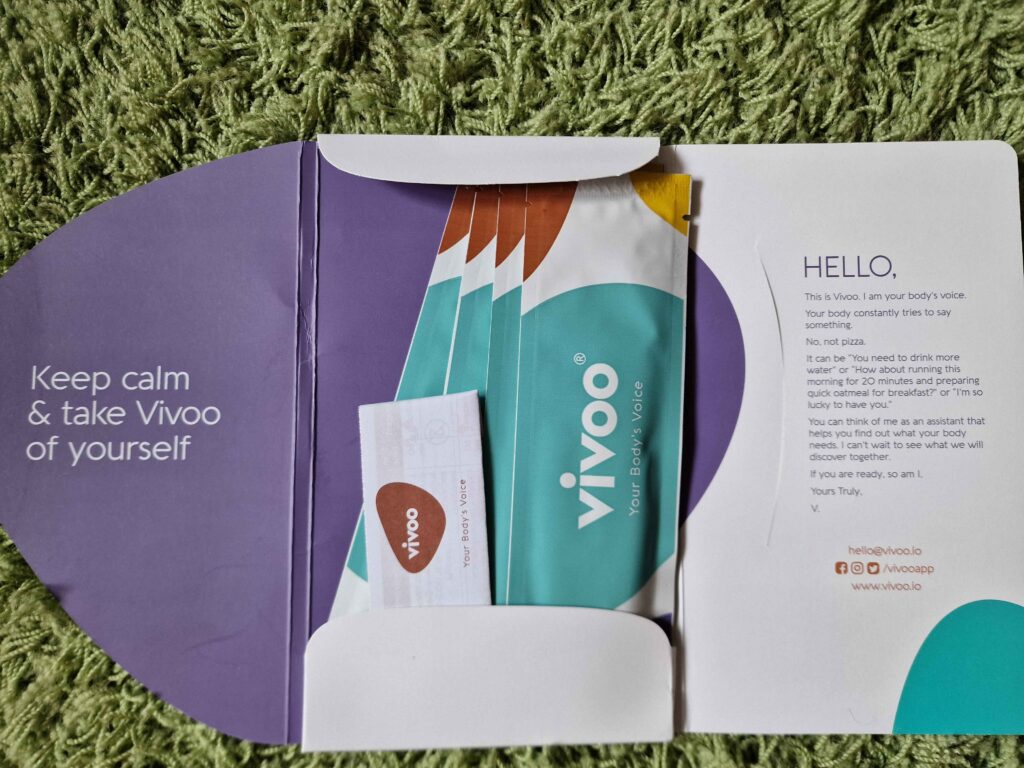
Vivoo is an at-home urine test and app that tracks 9 wellness parameters. Based on these 9 parameters user receives an overall wellness score.
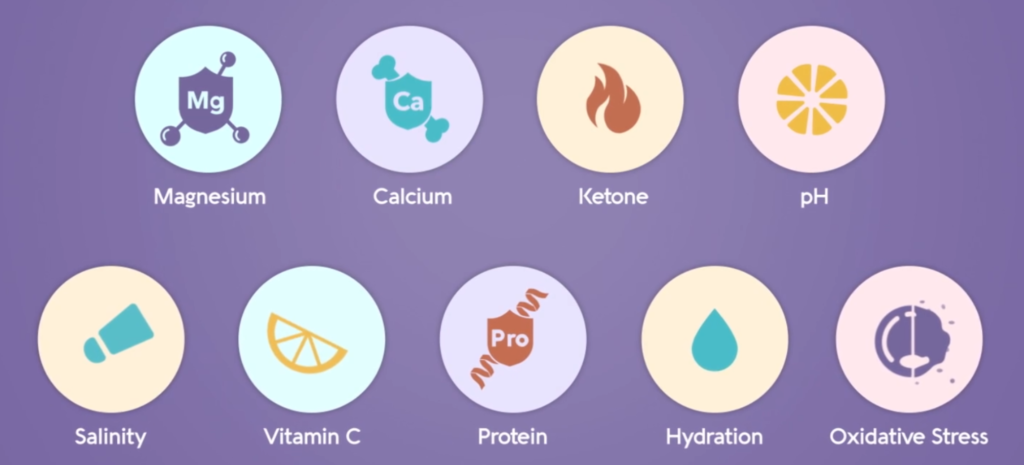
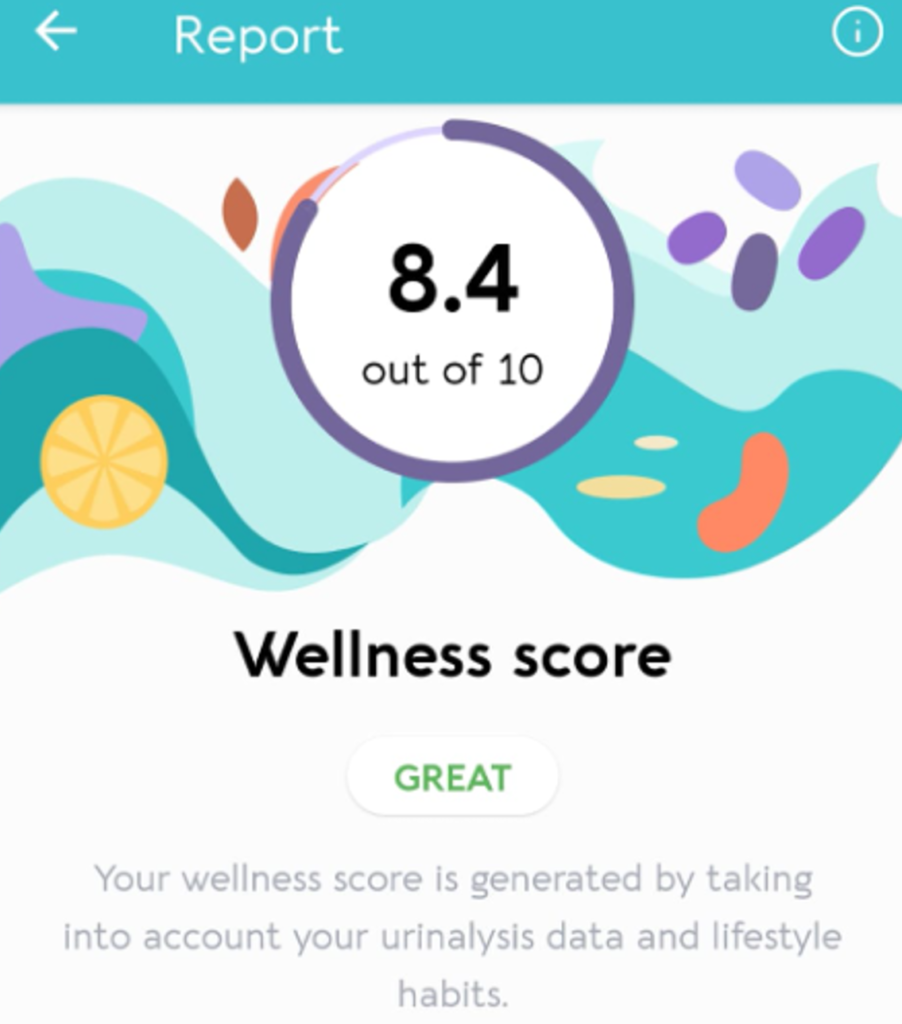
There are six parameters that I have not measured before (Ketone, pH, Oxidative Stress, Hydration, Protein, and Vitamin C). Rest I have measured via a blood test.
As someone who exercises 5-7 times a week and uses a sauna 3-5 times a week (sometimes 20-minute sessions), it’s interesting to see if my hydration and salinity levels are optimal.
I’m also frequently taking magnesium supplements, so it’s good to see where my levels are now.
Using Vivoo is simple, you urinate on the Vivoo strip, wait for 90 seconds and scan it with your phone. Results appear in the app in a few seconds.
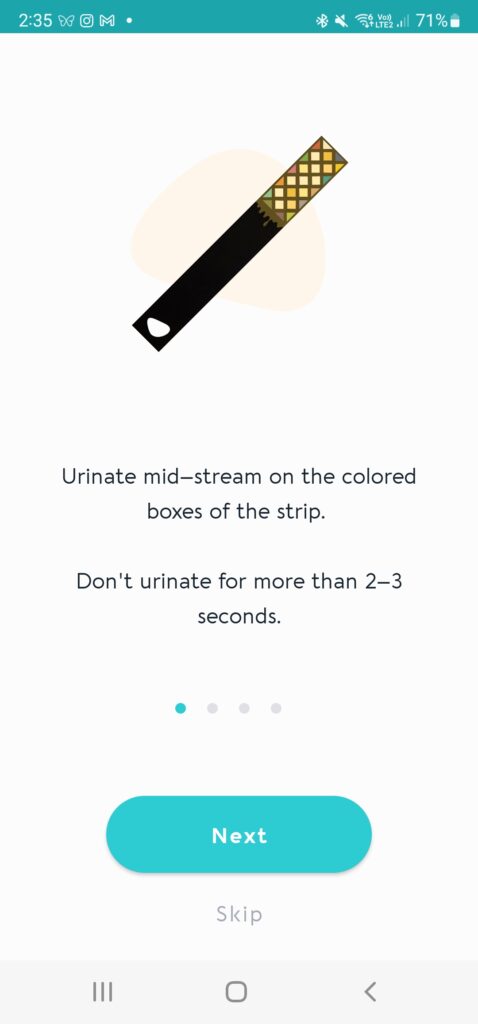
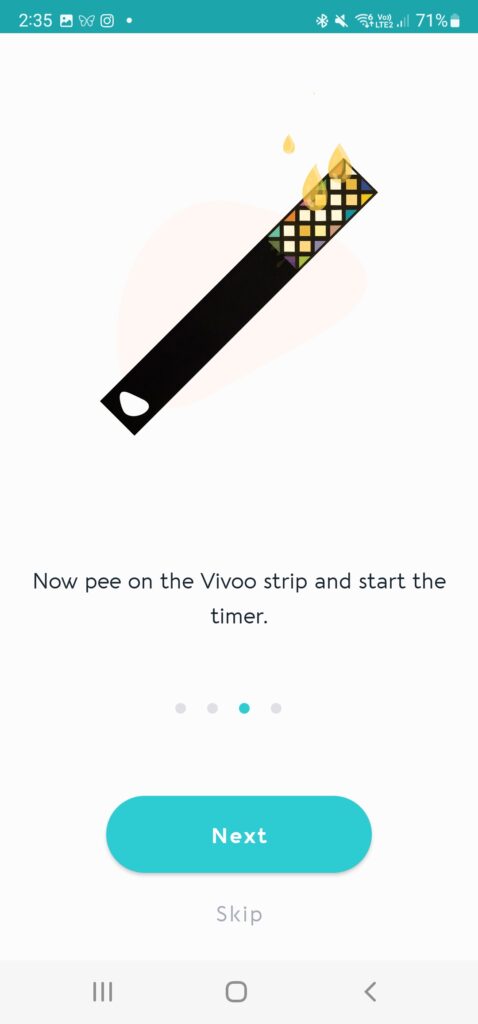
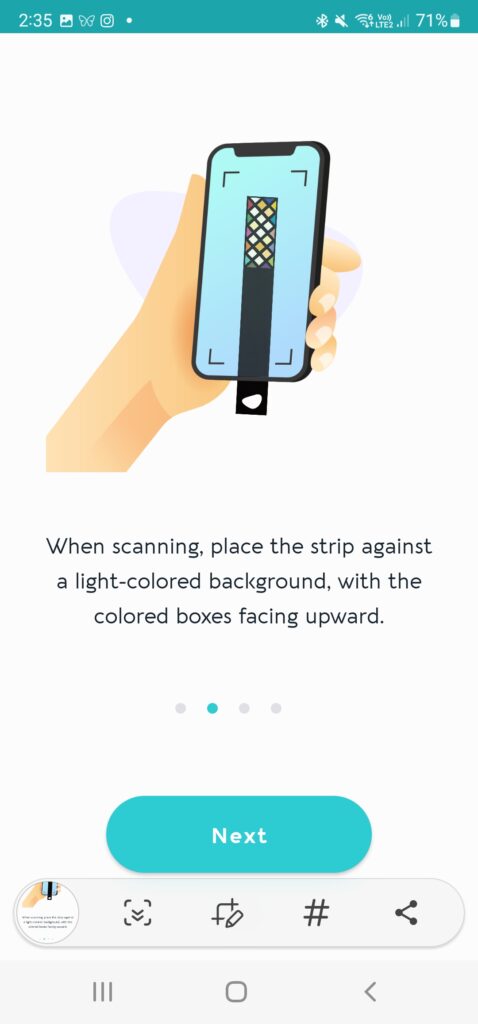
I’m still baffled at how we can just scan the urine strip, and all the data moves to the app, amazing innovation!
2. Is Vivoo accurate?
Accuracy is always a relevant question when we are measuring ourselves with different health tech (for example, sleep trackers and problems with accuracy).
Vivoo states in the user manual, “The product is not intended for diagnosing diseases or other conditions. It should not be used to determine or monitor the state of your health for curing, mitigating, treating, or preventing any disease or any of its symptoms.” This is important to acknowledge when ordering Vivoo.
One way to test accuracy is to do something extreme and compared those results against normal conditions.
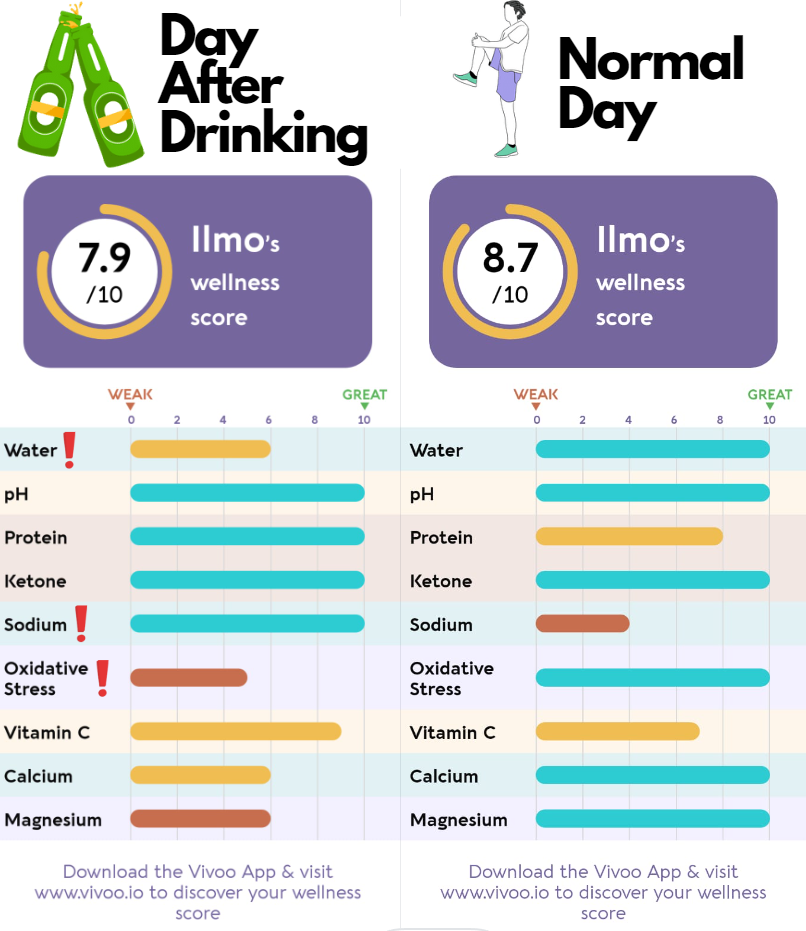
There are 3 major points from this comparison (red exclamation marks).
It was expected to see poor hydration status (water) in the morning after the night of drinking. This is a good sign of accuracy. Similarly, oxidative stress definitely something that you don’t have on the Vivoo test, but it’s deserved if you drink too much.
The case of sodium is kinda funny; you know the feeling when you are going home drunk, but you feel hungry, so you choose the most unhealthy takeaway choice. I ate Mcdonald’s around 3.00 am, went to bed, woke up around 10.00 am, and took the Vivoo test. My sodium levels were 10/10 (200mg/dL), which means optimal.
I wasn’t expecting this! Definitely, we shouldn’t optimize our sodium levels by consuming Mcdonald’s. A potential explanation is that the alcohol depleted my sodium levels, but Mcdonald’s counterbalanced it.
I will discuss more the accuracy in part 3 when I go through different parameters.
Overall I can say that Vivoo wellness parameters seem to fluctuate like they should, which is a good sign (that said, I didn’t test Vivoo against laboratory grade urine test).
3. My Vivoo results per wellness parameter
Next, I will go through all my results with different Vivoo parameters, focusing on ones that I found relevant insights or interesting studies on all-cause mortality.
Water (Hydration)
Let’s start with the key of life, water. According to a newly published study, higher water intake is associated with lower mortality risk among the United States population [1]

Here are my overall Vivoo hydration results:
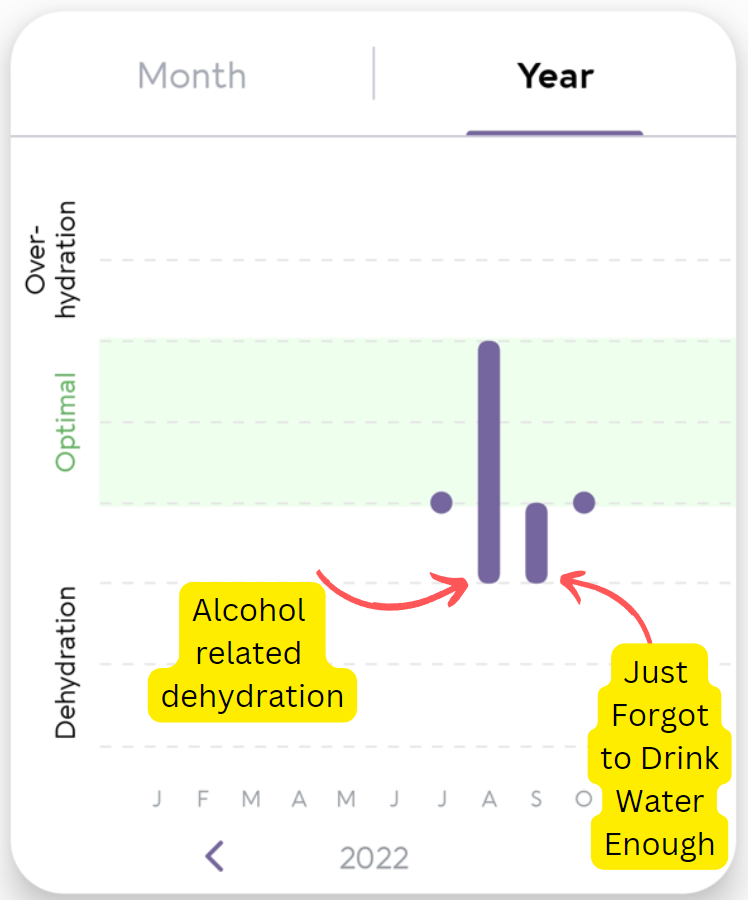
Out of 9 measurements, I was dehydrated 2 times. The first case was the drinking night, and the second time, I just forgot to drink enough water (I noticed abnormally short morning urine, which then manifested poor hydration score with Vivoo)
On hot summer days with exercise, I drank around 4,5 liters (150 ounces) of water, which gave me a the following morning a score of 10/10. This is interesting insight as sometimes I wonder If I drink too much water.
I was also curious to see if there’s a connection between hydration and recovery:
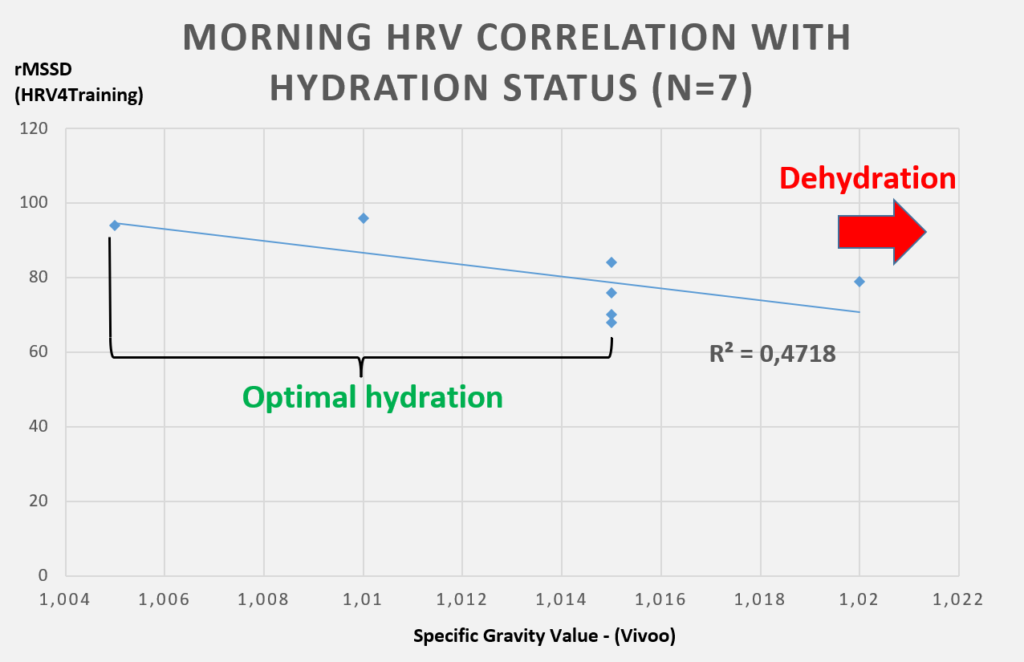
The sample size is too small to draw final conclusions, but it seems that my morning HRV (measured by HRV4training) correlates with hydration status. Dehydration or being close to dehydration gives a lower rMSSD value.
This is aligned with scientific studies example, Severeyn (2016) states that HRV parameters are able to differentiate between phases of hydration and dehydration in the individual athlete [2]
pH
pH differs from other parameters, as its seem to be vastly stable, at least in my data.
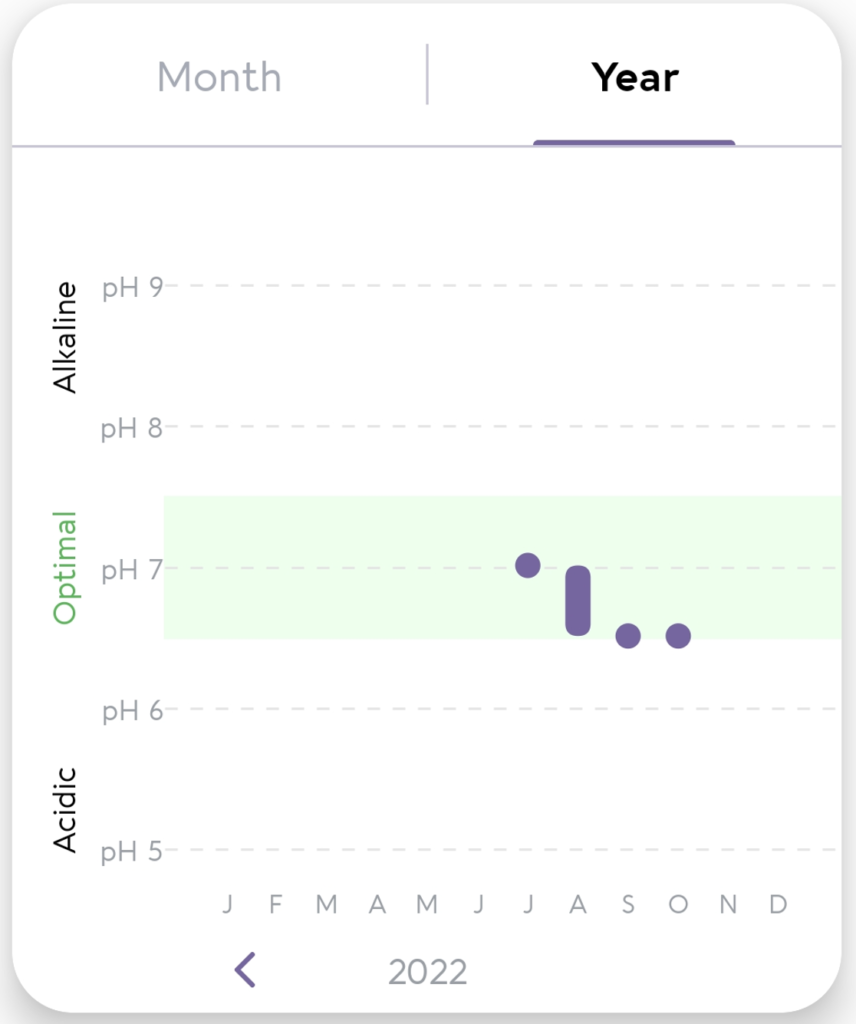
In 9 measurements there are only 2 different values, pH 7 and 6,5. A heavy night of drinking didn’t have an effect on pH.
There’s one scientific study on pH that caught my attention; Acidic and neutral urine pH was associated with higher all-cause mortality compared to alkaline urine pH [3].
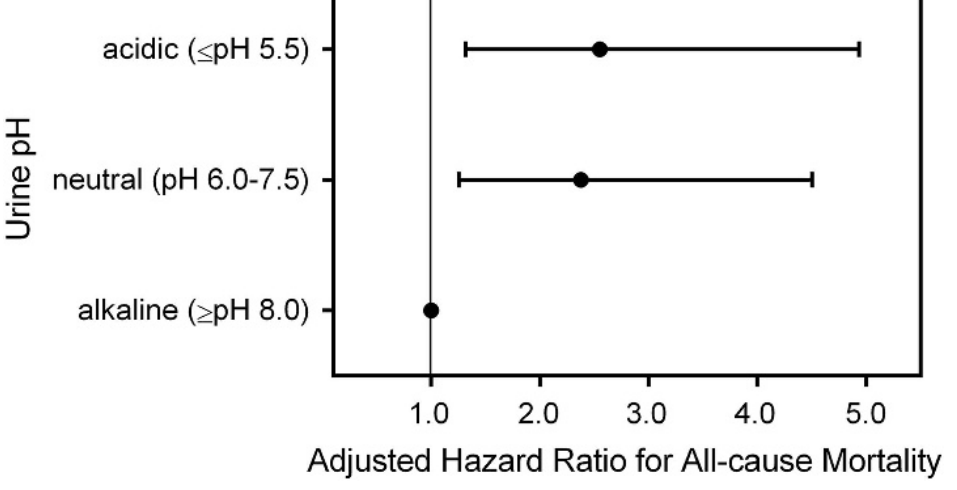
Vivoo’s optimal pH range is 6,5 – 7,5, and in comparison, Simerville et al., 2005 state that its normally 5,5 – 6,5 (slightly acidic) [4]
In sense, this pH all-cause mortality study supports the “Alkaline diet” hypothesis [5]
My knowledge of pH is very limited, so I cannot draw any conclusions from my data or the studies, but this is definitely something that I keep reading on.
Protein
Protein in Vivoo sense is not wanted as there shouldn’t be much protein in the urine. Damaged kidneys can release protein into urine which is called proteinuria.
Proteinuria can be serious in long term, as it can have higher hazard ratios than people with metabolic diseases and negative or trace proteinuria [6].
With protein, my data looks like this:
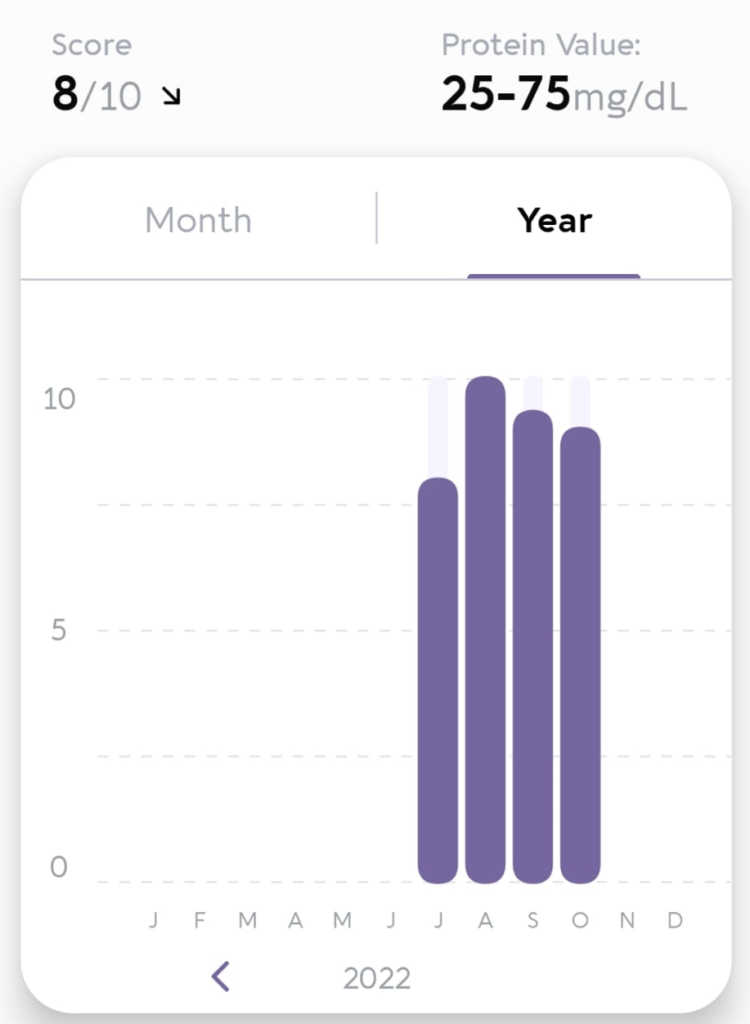
5 out of 9 measurements didn’t have any protein in the urine, or it was less than 25 mg/dL, which is optimal. In those 4 measurements protein range was 25-75 mg/dL. Vivoo states the following possible reasons for this:
Exposure to cold
Dehydration
Strenuous exercise
Emotional stress
I’m not concerned about the data, as it’s only in the 25-75mg/dL range, and my girlfriend also had the same result. Proteinuria has defined values greater than 150 mg per day [7].
Ketone
Similar to proteins, to get optimal scores with Vivoo, there shouldn’t be any ketones in the urine. Overall my scores look like this:
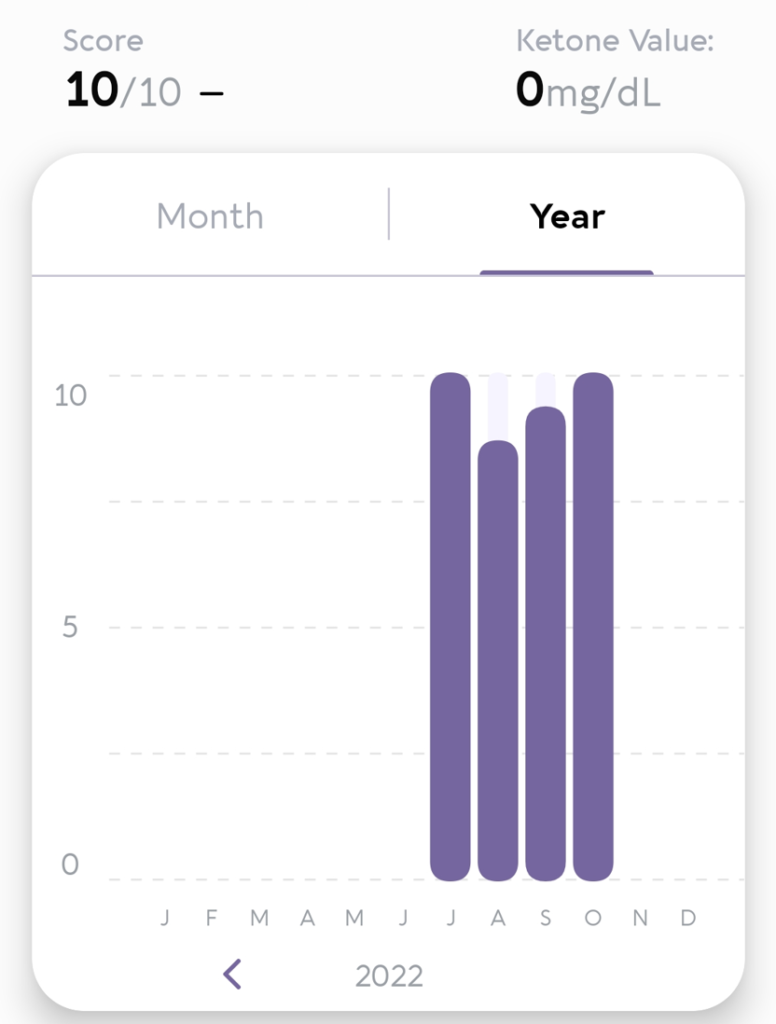
Six excellent scores (10/10) and three 8/10 which meant ketones in my urine were in the range of 5 – 15 mg/dL.
Sodium
Sodium is an interesting one; it was one parameter that I had constantly in low scores.
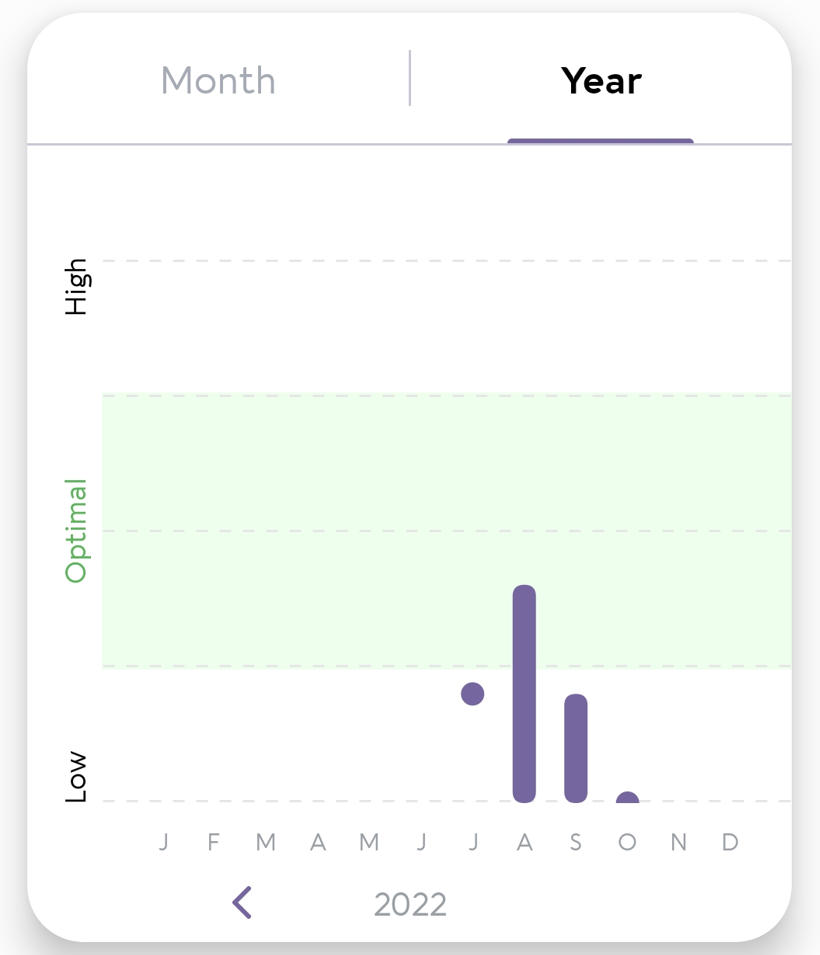
Only one time I achieved optimal scores, it was previously mentioned drunk night at Mcdonald’s (full of sodium)
I tried to tweak my poor scores by consuming electrolyte powder and pickled cucumber, but I didn’t see improvement.
Should I be worried here? Sodium is an essential mineral for various functions in the body.
The case of Sodium (low or high) in all-cause mortality seems to be still a mystery, as there are studies concluding both ways [8] [9] [10]
For now, it’s relevant to look at more data to draw the conclusion:
Oxidative stress
There were three times when Vivoo showed positive results on oxidative stress. I think I have an explanation for all of them.
For 2 of them, I blame alcohol. The first one is obvious, the morning after drinking. What was interesting was that the positive result was still visible around 50 hours later.
The last positive result is most likely connected to the flu I got. In the evening, I started to have flu symptoms, and the next morning I piss oxidative stress. This is well documented in science, viruses can induce oxidative stress [11]
The Positive is that in normal settings, I didn’t have oxidative stress (without drinking alcohol or flu)
Vitamin C
The first and last vitamin in the Vivoo parameter set, the C.
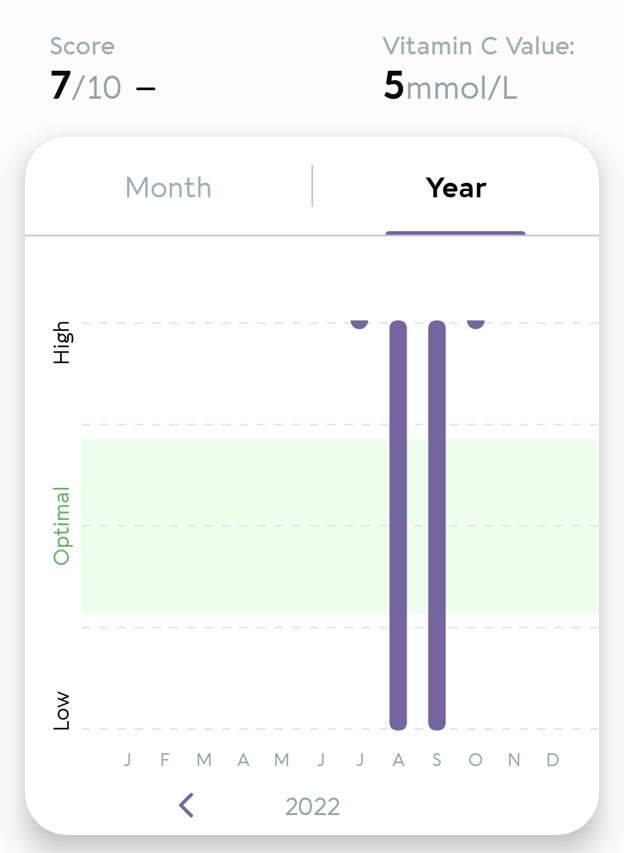
Before going into the results, I think the dashboard looks clunky, especially results like this. This is something that Vivoo could improve.
Vitamin C results were all over the place! Definitely reacting if I took vitamin-C supplements the previous day (like having flu and megadosing with vitamin C). It seemed to be the most sensitive parameter, but it accurately followed my previous day’s diet and supplements.
Calcium
Second last on the roster is calcium – Which is essential for healthy bones, muscle contractions, and nerve function regulation. This is measured by calcium creatinine ratio for enhanced accuracy.
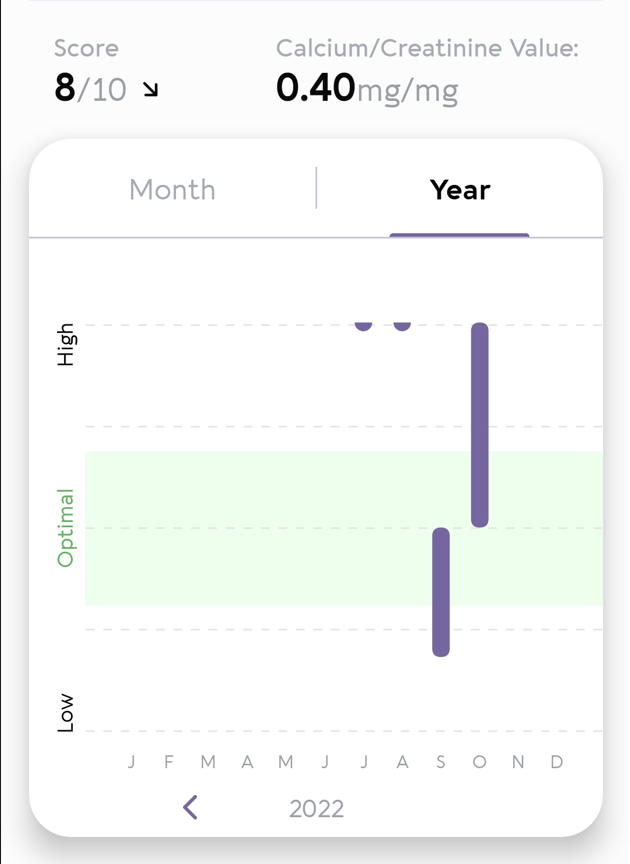
Over 50 % of the time, I had high value. Vivoo lists the following possibilities for this:
-Drinking tea and coffee
-Drinking alcoholic beverages
-Excessive consumption of salt
-Eating an excessive amount of animal-based protein
The first and last factors could be the reasons in my case. Luckily, greater urinary calcium excretion was not associated with higher overall cardiovascular event rate or mortality (a group with CHD). [12]
Regarding animal protein, I do like red meat, but I’m open to different experiments; one could be the reduce the amount of red meat to see if I can that way optimize my calcium levels.
Magnesium
Last but not least, magnesium. This one is interesting as I have been supplementing with magnesium before bed (around 150mg to 300mg)
My result showed possible over-supplementation:
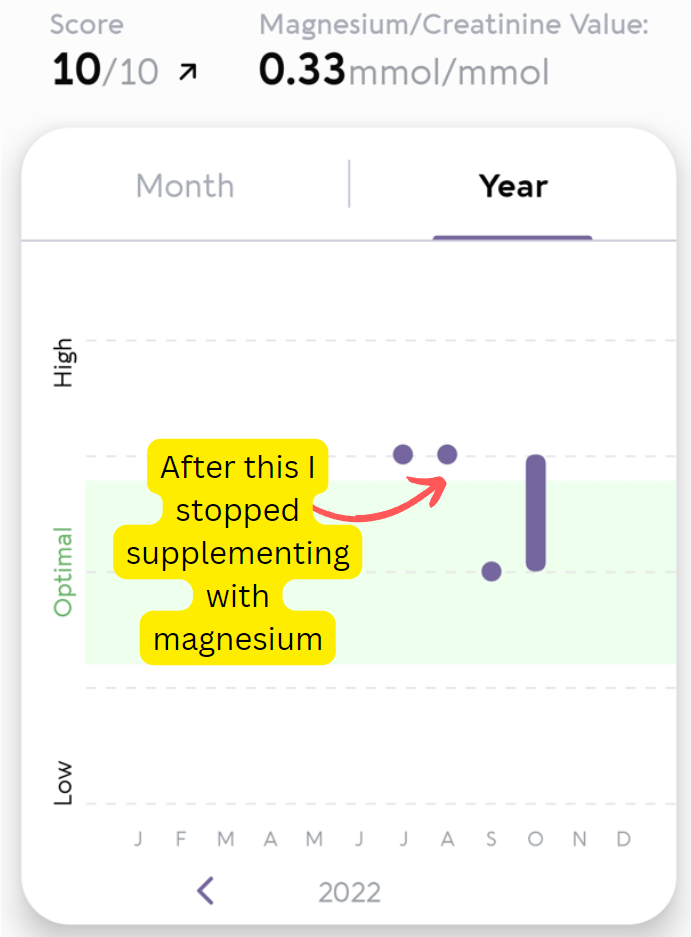
After stopping magnesium supplementation, I received an optimal score of 80% of the time (4 out of 5).
This could be the most beneficial insight found with Vivoo; not only do I optimize my magnesium levels, but I also save money by not buying magnesium supplements.
Like with sodium, I will check the magnesium levels in the blood to confirm this is the correct decision (end of 2022 or beginning of 2023).
4. Pros and Cons of Vivoo
What did I like about Vivoo? What could be done better?
Things that I liked about Vivoo
-Taking measurements is easy and fast (pee on the stick, scan it and receive wellness report)
-Comprehensive wellness parameters, and most likely, there are a few new ones for all of us
-You can get real insights
-Based on my experiments and experience, Vivoo seems to be accurate
-You can share the newest result in one pager form on social media/email
Things that I like to see improved
-App experience (Minor things like the clunky dashboard, not being able to share old results on social media, few random app crashes)
-Vivoo has published many articles (which is good), but they should be sorted based on the wellness parameters so it’s more convenient for the reader
-One of Vivoos main selling points is to offer personalized nutrition advice; a general, this is a good route. In Vivoo, personalized advice is based on urine results and maybe(?) on the personal information page that consists of 7 questions. I would like to see a more in-depth questionnaire that is used for personal advice or even questions that pop up when taking urine tests.
-Possibility to take raw data to excel
-Leukocytes (white blood cells) appeared in one of my test results, but that data disappeared after I took another test a few days later. This was confusing as leukocytes are not mentioned anymore on the Vivoo website. Maybe it was a bug remnant from the past when Vivoo still reported leukocytes?
-Average user values comparison (maybe based on gender and age group)
5. Key takeaways
I can already see the future in the next decade when smart toilet collects our urine during morning pee, and we instantly get a wellness score in our cybernetic eyes.
Before that, Vivoo is the best that is there to offer. With Vivoo, I found interesting insights that will change my behavior and supplementation routine.
I hope that Vivoo continues to develop its app experience and even the personalized nutrition feature, as I see room for improvement & growth here.
Ps. You can use my referral link to get -20% off your Vivoo order with code: Stromberg
(I receive a small commission)

